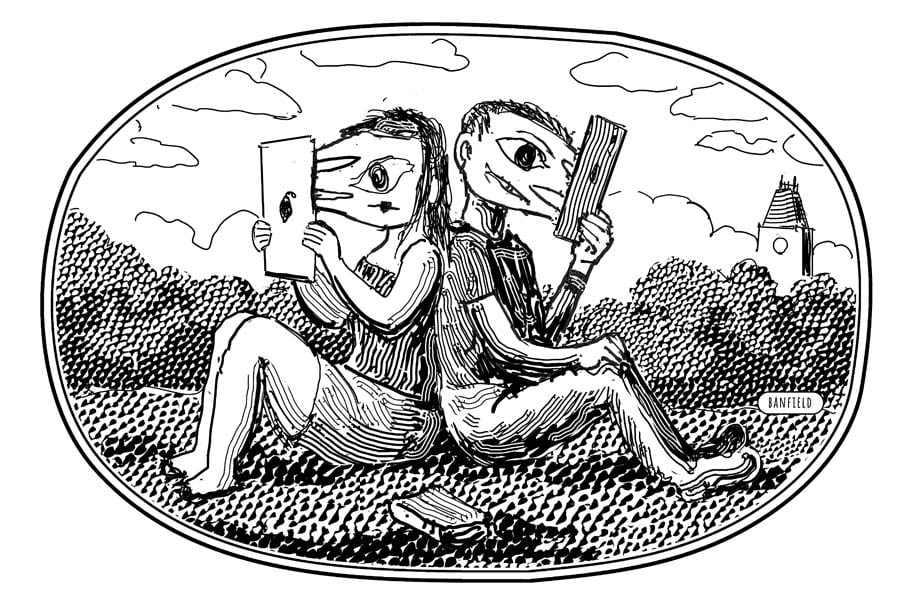Book Reviewed
“What have we done to them?” This curious opening line comes from Mark Bauerlein’s The Dumbest Generation Grows Up, an updated assessment of the cohort he branded The Dumbest Generation (2008). Bauerlein criticized the Millennials (born between 1981 and 1996) for texting too much and reading too little. “It was obvious to me,” wrote the Emory University English professor emeritus and First Things senior editor, “that a twenty-first-century teenager who didn’t read books or magazines or newspapers, who had no religion and ignored history, civics, and great art, would grow into an unsatisfied and confused adult.” And, indeed, the adolescent Millennials Bauerlein described 14 years ago are now 20- and 30-somethings, edging into middle age while suffering, according to some research, from anxiety, depression, loneliness, and even deaths of despair.
But Bauerlein pivots in his new book. Upon re-examining Millennials’ circumstances, he wants readers to know it wasn’t their fault. Rather, the Digital Age killed Millennials’ reading habits and their postmodernist mentors cut them off from the inheritance of Western civilization, leaving them ill-equipped to handle life’s problems and susceptible to utopian expectations. They were set up to fail. Contrary to what they had been led to expect, discrimination didn’t end and happiness didn’t proliferate.
* * *
Bauerlein pays special attention to the digital environment in which Millennials were raised. Using test scores and survey data on time-use habits, he finds that technology made young people worse off, not better. SAT reading and writing scores declined or flatlined nearly every year for a decade for “high school seniors who were born late enough for digital devices and habits to have touched them at tender elementary school ages and flooded their teen years.” Students did not read books in their spare time, Bauerlein explains. Surveys revealed Millennials understood that reading was more important than watching TV, playing video games, or chatting online, yet still couldn’t help themselves. Why? Because the digital activities hijacked their brains. Like gamblers unable to step away from a slot machine, Millennials became addicted to their digital environment’s inducements, where every scroll of the thumb, every like, comment, and funny meme, left them wanting more.
The Digital Age did not merely lower Millennials’ test scores. The damage was far more extensive. Although Bauerlein spends little time discussing social media’s toll on Millennials’ mental health, the price paid was significant. Like the tobacco industry, the social media giants—Twitter and Facebook in particular—sold products intentionally engineered to be addictive; the companies knew the dangers and concealed them. In the Netflix documentary The Social Dilemma, Silicon Valley engineers and psychologists reveal how they manipulated the human brain to keep people—especially young kids—on social media apps, successfully creating addicts and then unceasingly feeding their addictions. As usage increased, so did depression and suicide rates.
The Facebook Files, a Wall Street Journal series, subsequently corroborated these unsettling claims. Journalists combed through internal documents and discovered that Facebook knew, “in acute detail, that its platforms are riddled with flaws that cause harm.” Facebook conducted multiple studies, for example, showing that Instagram (which it owns) was harmful to sizable percentages of young users, especially teenage girls, resulting in anxiety, depression, and eating disorders.
* * *
Revisiting themes from his earlier book, Bauerlein laments Millennials’ lack of literary formation. Worse than missing out on the thrill of a good story, those who don’t read forfeit indispensable life instruction. The Dumbest Generation Grows Up cites studies showing that portions of a reader’s brain are activated in alignment with a character’s feelings and actions and that “when we read fiction, the brain actively simulates the consciousness of another person.” This “psychological coaching,” according to Bauerlein, would make young people more empathetic and understanding of different worldviews, and maybe even “kill the utopian dream.” Bauerlein blames parents and educators, whose failure to get as many children as possible to read as much as possible prevented young people from forming habits and dispositions highly conducive to happy, honorable lives.
Unfortunately for young people thus afflicted, The Dumbest Generation Grows Up is diagnostic but not prescriptive. Bauerlein concedes “there is no answer for it now. The Millennials have exited young adulthood forever; their intellectual habits are formed for life. They’re lost; they’re gone; it’s over for them.” He may be right that “omnipresent screens” and “lax mentors” in Millennials’ formative years made them miserable adults. But what good is such knowledge if there’s no hope, no chance of redemption?
* * *
Perhaps, though, the situation is more fluid, more remediable, than Bauerlein allows. Millions of Millennials are confused, anxious, and unhappy, yearning for direction and purpose. Mentors, Bauerlein included, have an opportunity to show them the way.
Take the Jordan Peterson phenomenon. The “most influential public intellectual in the Western world right now,” according to the New York Times, has amassed a prodigious following. He delivers a message that audiences, especially young men, are starving for: take on as much responsibility as they can bear, stand up straight, clean their rooms, and stop telling lies. Mixing psychology and the great stories of the West, Peterson proffers an understanding of the world and a way through it. As essayist Wesley Yang puts it, “[Peterson] aims at nothing short of a refounding of Western civilization, to provide a rational justification for why the materialists of the digital age should root themselves in the soil of Christian ethics despite having long ago lost the capacity for faith.” And Peterson has changed lives. Hundreds stay after his talks to tell him they’ve taken his advice and it’s working. They’ve defeated hopelessness, despair, even addiction.
There’s also an emerging new genre seeking to reconnect young people with the great thinkers of the past. Sohrab Ahmari’s The Unbroken Thread (2021), for example, is an “invitation to share in the treasures of Western civilization” as John Daniel Davidson put it in his CRB review (Summer 2021). Similarly, Rescuing Socrates (2021) by Roosevelt Montás illustrates the Great Books’ transformative power and argues for the widespread adoption of a classical core curriculum. Spencer Klavan’s podcast, Young Heretics, delves into the Western canon, teasing out wisdom for today’s problems. These writers sense the despair and angst that come from being denied a cultural framework. The younger generations are untethered from tradition. Ahmari, Montás, and Klavan want to retie the knot.





